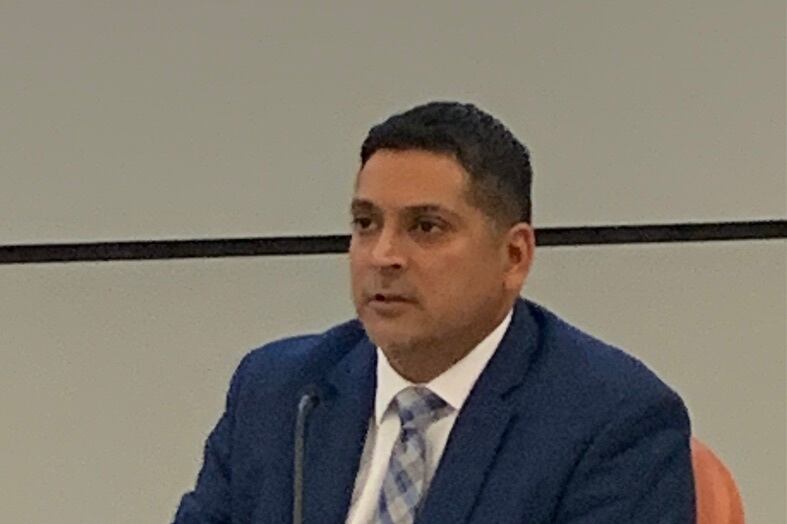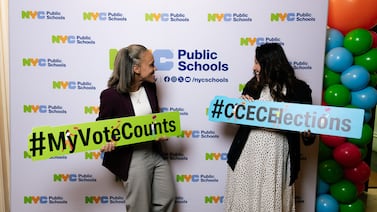Krish Mohip said he wants to lead the school district in Philadelphia “for the children” while acknowledging that providing high quality education education for all students will not be easy.
“I know coming to Philadelphia will be a challenge. I was talking to my wife and, honest to God, I said I feel like if I get this job I’ll be going into battle,” said Mohip, one of three finalists to lead the city’s public schools, in a Tuesday meeting with students. “But it’s a battle worth fighting. We’re talking about making generational change.”
In discussions with the Philadelphia education community, Mohip – who is the Deputy Education Officer for the Illinois State Board of Education – also talked about his past successes and struggles as a district leader in Chicago and elsewhere, empowering educators, and dealing with student trauma, among other topics. He was the second finalist to meet with city residents this week.
Mohip spent significant time discussing his turbulent time leading schools in Youngstown, Ohio, from 2016 to 2019, after the state had taken control of the district due to persistent academic struggles.
While he recounted successes during his tenure, such as a 15% increase in the graduation rate and huge jump in the percentage of ninth graders staying on track, Mohip said his family stayed in Chicago while he worked in Youngstown because “it was not safe” for them to be in Youngstown. His house in Youngstown was also vandalized, and Mohip said he received death threats.
Mohip ended up taking a medical leave several months before his tenure was due to end due to his father’s illness, he said, and did not return to his position. But he said that while he had “some detractors” he was not shaken by the death threats.“I was not afraid of some others that didn’t like the fact I was part of this [state] takeover,” Mohip told a group of Philadelphia educators. “I was focused on what I was sent there to do” and help children be successful.
In Youngstown, he described himself as the “sole decisionmaker” with the power, among other things, to make changes to the labor contract. At the same time, he said he was a “strong advocate of union labor” and worked with teachers and union leaders.
He also created four advisory councils to bring community concerns and input to his policymaking. “I worked with the community,” he said, and kept the Board of Education abreast of his work though they had no control over him.
Mohip said that two years into his three-year tenure, 91% of teachers said in a survey that the district was “moving in the right direction … By the time I left, I was a guy nobody wanted to see leave.”
Mohip said his mantra is not simply “all kids can learn,” but that “all kids want to learn,” and that if students aren’t keeping up, “it’s not about that child failing but we as adults failing them. … My belief is that every child has the ability to learn and it is up to the adults to make it happen.”
Asked about charter schools, he said his position “evolved over time.” While he was a principal and district leader, he didn’t want the competition from charters, he said. But now, he said, “I don’t think a child cares what governance structure a school is.” What matters, he said, is whether a school is high quality, and if it is failing students, what is needed to reverse it.
In Chicago, he started as a kindergarten teacher, served as a principal, and rose through the administration to be Chief of Schools. He talked about leading a group of 36 schools that needed a “complete reboot,” as he put it, and said he built collaborations with teachers and community members and visited schools often. He said wants he principals to build their managerial skills, reach out to the community, and ultimately improve achievement in the schools.
“You have to give principals the support and autonomy to do what is needed in schools,” he said.
One innovation in Chicago that he led, he said, was the creation of “peace centers” in schools in an effort to combat violence and help students deal with trauma.
“I lost a sister when I was 14, two weeks before I started high school,” Mohip said. “I understand depression. One thing that brought me back was a school counselor, who showed me what was possible.”
In his current job, Mohip said, he helps oversee the spending of federal COVID recovery funds for schools, among other duties.
Asked about “rebuilding trust” in a district where it has been eroding, he said that he considers himself to be “transparent and honest. If something is not working, I’ll tell you … I’m all about transparency.” He also said that “culture is more important than strategy,” and that he is “a big believer in organizational health.”
Mohip, who said he is the child of immigrants from Trinidad and Tobago, pledged to advocate for more funds from the state for city schools working with local lawmakers, community stakeholders, and others. But he also indicated he would push hard to get city schools what they needed. “I’m not afraid of a fight,” Mohip said.
If he is chosen for the job, Mohip told a few dozen people who came to a public town hall, that his first priority would be to learn about Philadelphia. He also said he would send his children to district schools.
Mohip praised Superintendent William Hite’s leadership and the fact that he stayed for 10 years. He said that if he is hired in Philadelphia, he hopes it is for the long haul.
“This is not a stepping stone to something else, this is me believing I have value to add to this organization,” he said.
On Monday, Philadelphians heard from finalist John L. Davis, the Chief of Schools in Baltimore. Another finalist, Tony Watlington, the Superintendent of the Rowan-Salisbury School District in North Carolina, will meet with parents, educators, and students on Wednesday.
Dale Mezzacappa is a senior writer for Chalkbeat Philadelphia, where she covers K-12 schools and early childhood education in the city. She is a former president of the Education Writers Association. Contact Dale at dmezzacappa@chalkbeat.org.







